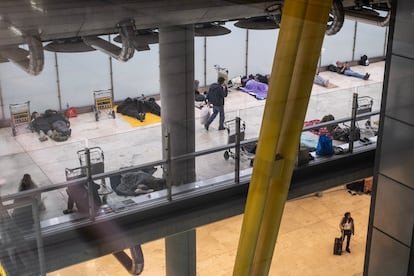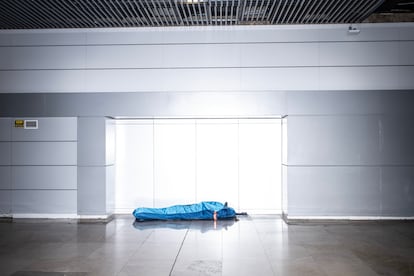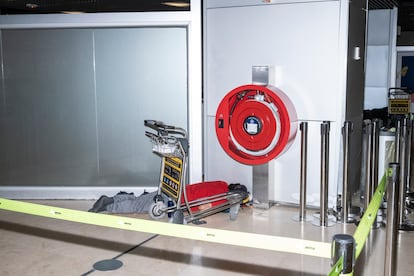The homeless people of Madrid’s Barajas airport: ‘I’m sick of sleeping on the floor’
EL PAÍS visits the terminals and speak with the highly vulnerable individuals, both Spanish and foreign, who are taking shelter there

Between 300 and 400 homeless people sleep each night at Madrid’s Barajas Airport. The number has reached as many as 500. No one knew who they were until a religious organization — Mesa de la Hospitalidad, which includes Caritas — took the initiative to carry out a census. Nearly three months after the issue emerged, the report was presented this Monday to municipal, regional, and national authorities.
Until now, none of the administrations had shown interest in getting the full picture: although they claimed to be working on the issue, they were doing so completely in the dark.
Two EL PAÍS journalists toured all four terminals of Madrid’s airport on Friday night to try to get to know its overnight residents.
In the absence of that census, interviews with more than 20 people — both Spanish and foreign — reveal the extreme vulnerability of Barajas’ overnight residents: individuals with serious mental health issues, illnesses, unemployment, no money to pay for a room, and no access to beds in municipal shelters.
Among these individuals and their acquaintances — a total sample of about 100 people — this newspaper did not find any of the “many” asylum seekers that the Madrid City Council claims are among them.
“The number is nonexistent or very, very small,” said Maurici Lucena, the president of the Spanish airport authority AENA, on Friday.
The mayor of Madrid, José Luis Martínez-Almeida, from the conservative Popular Party (PP) has cited the presence of asylum seekers — people requesting protection in Spain after fleeing their countries — as a reason to place responsibility on the central government, since their reception should be guaranteed by the Immigration Ministry.
These are the stories of some of the homeless people who are sleeping in Barajas airport.
Rosa V., without shelter after the winter campaign
The pineapple juice is stolen. Perhaps that’s why it needs to be drunk faster than usual. After Josué, Santiago, and Manuel take a drink, the last sip goes to Rosa V., a 67-year-old woman from the Madrid neighborhood of Vallecas who doesn’t want to reveal her real name.
Rosa says she ended up on the street after a series of disputes with her ex-husband and that, after the end of the winter shelter campaign, she no longer has a place in the municipal shelters. To show how drastically her life has changed in just eight months, she shows a photo on her cell phone dated October 24, 2024.
“Not even the eyes are the same,” she says about herself after removing her sunglasses. Now, her face is tired, wrinkled, and poorly nourished. Rosa V. is from Madrid, visits certain soup kitchens during the day, and so far, according to her and most of those interviewed, she has never met any of the City Council’s outreach teams that supposedly come to Barajas.

None of Rosa V.’s companions are asylum seekers. Nor is any of them able to identify anyone among the other homeless individuals around them who is. Rosa V. asks her companions what options she has, who they think she should turn to. Her experience with the social worker hasn’t been entirely positive. “The timelines they give me are too long. I think a lot of us get lost during that wait,” she says.
She mostly seems lost. “I would accept any kind of support resource without hesitation, just like I accepted the winter shelter,” she adds. None of her companions give her a clear answer — several of them don’t even have papers yet. Josué, 36, the most experienced among them, suddenly shifts the tone of the conversation. “Rosa, to me it sounds like you have signs of depression,” he says.
Rosa, once again hidden behind her sunglasses, falls silent. “No. I’m not depressed. What I don’t have is a roof over my head. You give me a roof, and you’ll see…” she finally replies.
Paulina, from exploitation to the floor of Barajas
As midnight approaches, Paulina prepares her bed — a piece of cardboard and some spotless sheets — to go to sleep. This 60-year-old Peruvian woman ended up on a patch of floor in Terminal 1 after standing up to her employers, a Spanish family that had exploited her for nearly a year. She worked as a live-in caregiver for an elderly woman for just €800 ($890) a month. She also worked weekends in exchange for being allowed to sleep at the house during those days.
“I put up with a lot. The lady treated me very badly. Until they told me they wouldn’t pay me for my vacation if I took it. ‘Take it or leave it,’ the son said to me,” she recalls. And she left — knowing full well it meant ending up on the street. Paulina is not an asylum seeker, and she would now be considered a homeless person who should fall under the care of the Madrid City Council. They did assist her for a few days, she says, but eventually forced her to leave.
“At the end of March, when I left the house, I went to [Madrid’s social service emergency agency] Samur Social and they took me in for five days. But the winter shelter campaign ended, and they told me I had to go,” she recalls.
Afraid to sleep in the streets, she went to the airport terminal, where she has been living for a month. During the day, she wanders with her carry-on suitcase between soup kitchens and various churches in Madrid, hoping they can help her find a job.
“At 60, it’s harder — they prefer younger women,” she says. Paulina would like to live in a municipal shelter until she can get back on her feet, but she says there’s no space for her. Going back to her home country is not yet an option. “I’m going to hang in there,” she says.
Teresa, her whole life in a storage room
Teresa Andrade, 54, lost the little she had in just a few days. This Spanish woman of Ecuadorian origin spent almost 25 years cleaning and caring for the elderly, but in January, she lost her job. Andrade recounts an incomprehensible bureaucratic mess that would explain why she has yet to start receiving unemployment benefits, the reason she no longer has the €400 ($445) needed to pay for the room she shared with her partner in Leganés.

Without her salary, they both ended up on the street. They put their belongings in a storage unit, and headed to Barajas.
“I’m sick of sleeping on the floor. There are more crazy people here than in a psychiatric hospital,” she exclaims. The woman claims she is in contact with a social worker in Leganés, but no one from the City Council has asked her anything at the airport.
Marcelo’s six pre-heart attacks at Terminal 2
Marcelo Montoya sticks his head out from under one of the moving ramps in Terminal 2. Montoya weaves together a thousand and one stories that have complicated his life in Spain since he moved here 19 years ago from Chile. He says he has been living at the airport for the past three years.
And he fears he might die. “I’ve suffered six pre-heart attacks since I’ve been on the street. I would go to a shelter, I’m sick, but I’m tired of trying. Every time I go, they get angry. ‘Why are you here if we’ve already told you you’re on the waiting list?’ they tell me.”
Sign up for our weekly newsletter to get more English-language news coverage from EL PAÍS USA Edition
Tu suscripción se está usando en otro dispositivo
¿Quieres añadir otro usuario a tu suscripción?
Si continúas leyendo en este dispositivo, no se podrá leer en el otro.
FlechaTu suscripción se está usando en otro dispositivo y solo puedes acceder a EL PAÍS desde un dispositivo a la vez.
Si quieres compartir tu cuenta, cambia tu suscripción a la modalidad Premium, así podrás añadir otro usuario. Cada uno accederá con su propia cuenta de email, lo que os permitirá personalizar vuestra experiencia en EL PAÍS.
¿Tienes una suscripción de empresa? Accede aquí para contratar más cuentas.
En el caso de no saber quién está usando tu cuenta, te recomendamos cambiar tu contraseña aquí.
Si decides continuar compartiendo tu cuenta, este mensaje se mostrará en tu dispositivo y en el de la otra persona que está usando tu cuenta de forma indefinida, afectando a tu experiencia de lectura. Puedes consultar aquí los términos y condiciones de la suscripción digital.








































